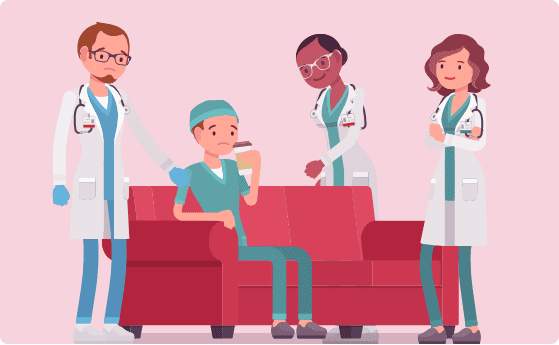 Community resources
Community resources
National Alliance on Mental Illness (NAMI)
NAMI is the nation’s largest grassroots mental health organization, dedicated to building better lives for the millions of Americans affected by mental illness. There are more than 600 NAMI organizations and affiliates across the country offering an array of free support and educational programs. To find your local NAMI affiliate, click here.
- NAMI Family Support Group: Free, confidential and safe groups of families helping other families who live with mental health challenges by using their collective lived experiences and learned group wisdom.
- NAMI Connection: A weekly recovery support group for people living with mental illness in which people learn from each other’s experiences, share coping strategies and offer encouragement.
Seize The Awkward
Seize The Awkward – Be the Friend Who Listens – offers tools to help you have critical conversations about mental health. Starting a conversation about mental health does not need to be uncomfortable, and it can make all the difference.
- Learn the warning signs of mental illness and know when extra help is needed
- Tap into conversation guides to get you started on the right track

Mental Health First Aid (MHFA)
Mental Health First Aid Training courses are offered by the Bert Nash Center in Lawrence, KS and designed to give you the skills to help someone who may be experiencing a mental health crisis. You’ll learn the warning signs of mental illness and substance use disorders and how to help when needed using a five-step strategy. You’ll also practice what you learn, applying these strategies as if you were helping someone through a panic attack, engaging with someone who may be suicidal or assisting an individual who has overdosed. Public and private classes are available in-person and virtually. Click here to learn more or email MHFA@bertnash.com.
Behind the Smile
Behind the Smile: Healthcare Professional Suicide Prevention offers support and resources specifically for healthcare workers, who are at an elevated risk for suicide. Confidentiality concerns, time constraints, worry about negative ramifications on licensure and the perception that it is taboo to seek mental health care are just some of the barriers to seeking help for healthcare workers. QPR (Question, Persuade, Refer) training is available to help you learn how to recognize the warning signs of suicide, offer hope and get help. Contact Tanner Funk, DNP, RN, TFunk@kumc.edu if you would like to attend a class. All classes are conducted live via Teams.
Self-reporting and support for mental illness and substance abuse
There are several organizations that support healthcare professionals through self-reporting of and support for substance abuse and mental illness.
- For nursing professionals: The Kansas Nurse Assistance Program (KNAP) is a voluntary program that serves LPNs, RNs, LMHTs, APRNs and CRNAs struggling with substance abuse, mental heath issues or decreased cognitive functioning. KNAP provides consultations, referrals, treatment recommendations and monitoring services, including random drug screens.
- For physicians and other health professionals: Heart of America Professional Network, Inc. (HAPN) serves Kansas healthcare professionals who may be struggling with impairment, including physicians, PTs, OTs, RTs, radiological technicians, athletic trainers and substance abuse counselors. HAPN works with individuals to get a professional assessment for their specific issue(s) and offers ongoing support through monitoring, individual treatment or group support. HAPN is a confidential alternative to a discipline program. Those who self-refer can remain anonymous to their respective professional board and avoid potential disciplinary action by the board, as long as they remain compliant with program requirements.
- For pharmacy professionals: The Kansas Pharmacists Recovery Network (KsPRN) is a voluntary program that serves Kansas-licensed pharmacists, pharmacy technicians and pharmacy interns who may be struggling with chemical dependency and/or other physical or mental health issues. The program, administered by the Kansas Pharmacists Association for the Kansas Board of Pharmacy, provides an opportunity for professionals to remain in or return to the workforce while seeking treatment.




